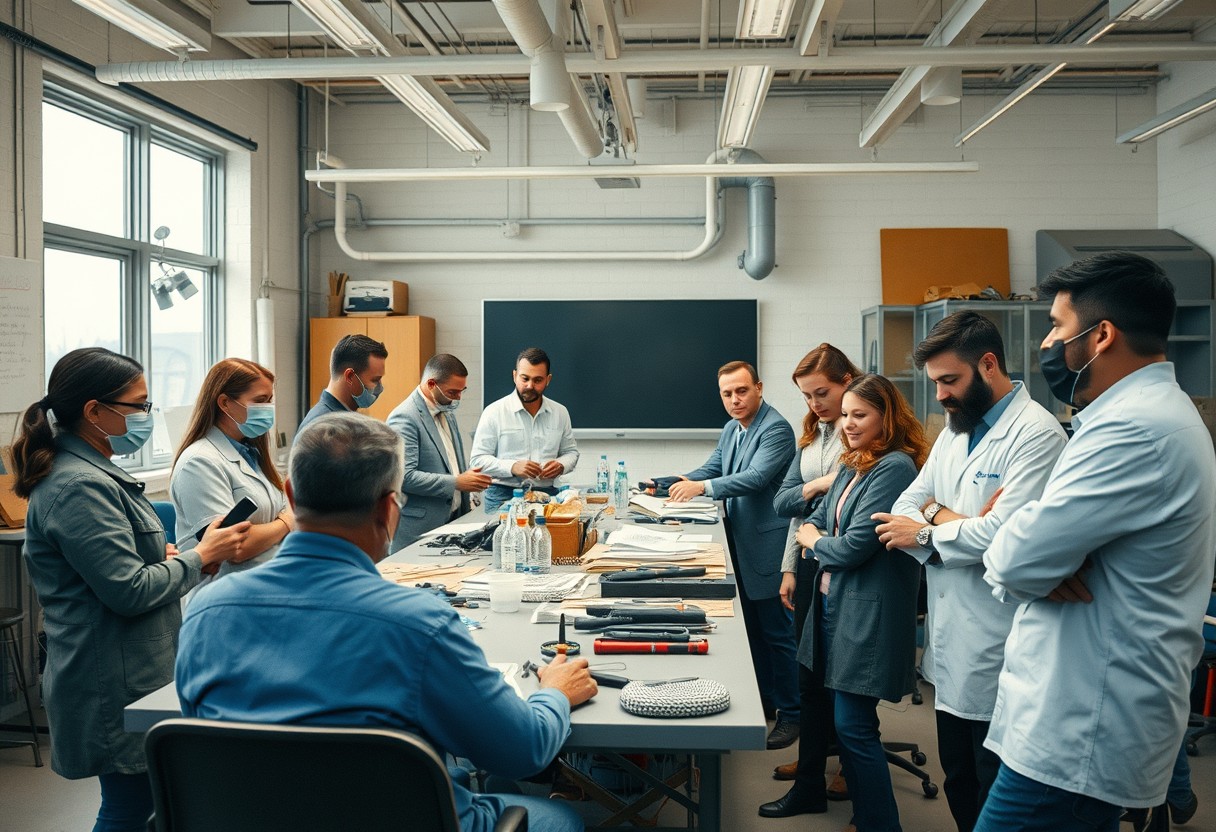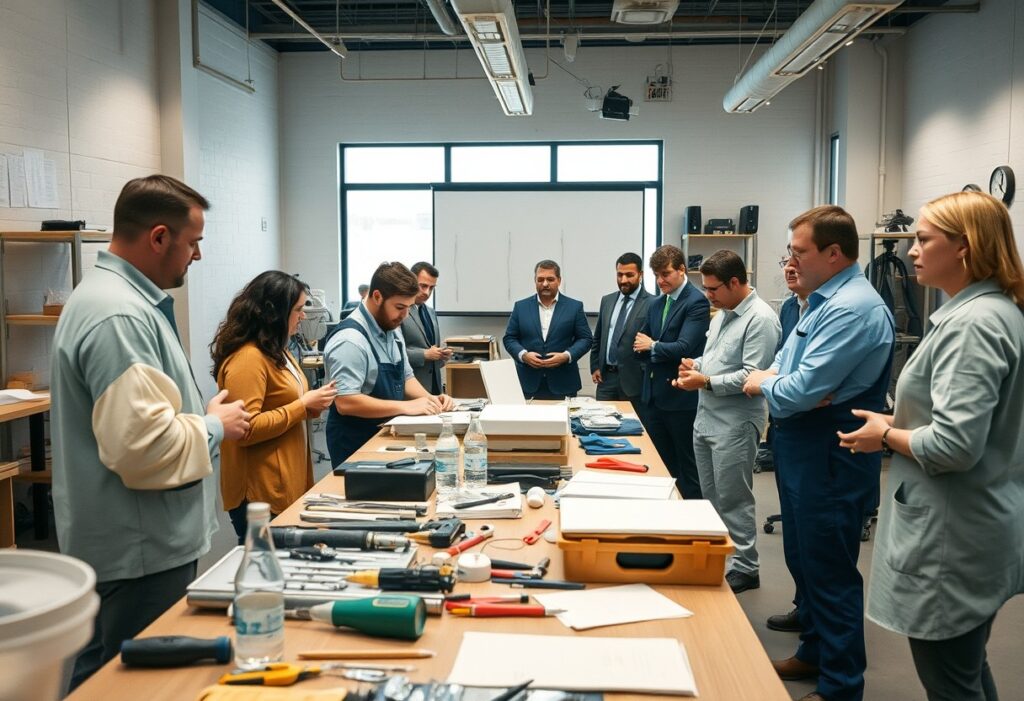Over the years, in-house training workshops have become a vital part of elevating the quality of restoration services. These tailored sessions empower you and your team to strengthen skills, enhance knowledge, and embrace best practices, all within the comfort of your workspace. By investing in these workshops, you are not only improving your service delivery but also boosting team morale and collaboration. Join us as we explore how Service Pro Restoration Bryant training opportunities can lead to exceptional results in your restoration services, benefiting both you and your clients.

The Importance of In-House Training
To truly excel in restoration services, in-house training is key. It empowers you and your team to stay updated with the latest techniques, technologies, and industry standards. With a focus on specific needs, in-house training cultivates a culture of continuous improvement, ensuring that you provide the best possible service to your clients.
Boosting Employee Skills
Training your employees through specialized workshops not only enhances their technical skills but also builds their confidence. As they gain knowledge and hands-on experience, they become more adept at tackling challenges and providing effective solutions. This investment in personal development reflects positively in the quality of service you deliver.
Enhancing Team Collaboration
Enhancing collaboration among your team members is vital for creating a harmonious and efficient work environment. When you invest in in-house training, it provides a platform for team interaction, encouraging communication and shared learning experiences.
A well-structured in-house training workshop helps break down silos and fosters camaraderie among your team members. By working together in a collaborative setting, employees can share insights and ideas, leading to innovative solutions that benefit your business. This cohesive atmosphere not only improves morale but also significantly boosts productivity, making everyone feel more engaged and valued in their roles.
Designing Effective Workshops
The key to designing effective in-house training workshops lies in understanding the specific needs of your team. By focusing on relevant topics and tailoring the content to address those areas, you can cultivate an environment where learning thrives and your restoration services improve. Engaging your team with practical and appealing materials will make the workshops more enjoyable and productive for everyone involved.
Identifying Key Areas of Focus
After assessing your team’s current skills and knowledge gaps, you can identify the key areas that need attention. This thoughtful evaluation helps you pinpoint specific topics that will provide the most value and contribute to your team’s growth. By addressing these focal points, you can ensure that your workshops are relevant and targeted, ultimately leading to better outcomes in your restoration services.
Incorporating Hands-On Activities
At the heart of effective learning are hands-on activities that actively engage participants. By incorporating practical exercises, role-playing, or group discussions, you provide your team with the opportunity to apply and refine their skills in real-world scenarios. These interactive elements not only enhance retention of information but also encourage teamwork and communication among your staff, building a stronger foundation for your restoration services.
Workshops should be lively and engaging, seamlessly blending theory with practice to keep your team motivated. Providing simulations or case studies allows participants to tackle real-life challenges, deepening their understanding and boosting their confidence. Craft your activities to encourage collaboration and problem-solving, so they’ll leave with not only knowledge but also a sense of achievement. Finally, promote a supportive atmosphere where your team feels comfortable taking risks and asking questions, as this will foster a culture of continuous improvement in your restoration services.
Engaging Session Formats
Now, it’s time to explore engaging session formats that keep participants actively involved. By incorporating diverse methods, you can create an environment that fosters collaboration and enthusiasm among your team members. Whether through group discussions, hands-on activities, or real-life case studies, the right formats can significantly enhance understanding and retention of information.
Interactive Learning Techniques
Around the core of effective training are interactive learning techniques that encourage participation. By using activities like role-playing and breakout sessions, you engage your team and make the learning experience enjoyable. It allows everyone to share their insights, ask questions, and build camaraderie, ensuring that you all grow together.
Leveraging Technology in Training
Around the digital landscape, leveraging technology in training opens up new avenues for engagement. Tools like webinars, online quizzes, and interactive simulations can transform traditional training sessions into dynamic experiences, allowing you to cater to different learning styles while keeping everyone motivated.
Further, technology can enhance your training by providing instant feedback and tracking progress over time. You can integrate learning management systems that allow you to customize content and assess the effectiveness of your workshops. Considering the integration of virtual reality or augmented reality can also offer immersive experiences that simulate real-world scenarios, making your in-house training even more impactful.
Measuring Success
For your in-house training workshops to truly shine, measuring success is vital. By keeping track of your progress, you can see what’s working and where improvements can be made. This process not only helps you to understand the effectiveness of your training but also ensures that your restoration services are continually evolving and meeting the needs of your clients.
Setting Clear Objectives
An effective workshop begins with clear objectives. By defining what you hope to achieve, you provide direction for both you and your team. This practice helps you stay focused and gives everyone involved a tangible goal to work towards, making the training more engaging and productive.
Evaluating Workshop Outcomes
Measuring the outcomes of your training workshops allows you to assess their impact on your team’s skills and knowledge. You can gather feedback through surveys or direct observations to gauge how well your objectives were met. This evaluation not only highlights your successes but also uncovers areas for further development, ensuring that your training efforts yield the greatest benefit.
Evaluating the outcomes of your workshops goes beyond just analyzing numbers and feedback forms. It’s about fostering open discussions with your team regarding their experiences and what they found valuable. By encouraging dialogue about challenges faced during training, you can continuously adapt your approach, ensuring your workshops remain relevant and effective in boosting the skills needed for excellence in restoration services.
Addressing Challenges
Unlike traditional training methods that may not address specific needs, in-house workshops allow you to tackle unique challenges within your restoration services directly. This tailored approach helps identify areas for improvement and fosters a culture of continuous growth, empowering your team to overcome obstacles together.
Overcoming Resistance to Training
Between addressing performance gaps and fostering a growth mindset, you may encounter some resistance from team members who are hesitant about new training initiatives. It’s important to communicate the benefits clearly and involve them in the process, turning their apprehension into enthusiasm.
Maintaining Engagement Throughout
Engagement is key to the success of any training program. When your team feels invested, they’ll be more likely to absorb the material and apply it effectively.
Even simple strategies, like interactive activities and real-life scenarios, can significantly elevate engagement levels. By incorporating hands-on experiences and encouraging open discussions, you create an environment where your team feels comfortable participating and sharing ideas. Keep the momentum going through follow-up sessions and provide ongoing support, ensuring that your training efforts lead to lasting improvement in their skills and confidence.
Success Stories
Despite initial challenges, the in-house training workshops have resulted in noteworthy transformations in restoration services. Many organizations have embraced these programs, witnessing improved efficiency and enhanced skills among their teams. These success stories highlight the positive impact of investing in education and development, leading to outstanding customer satisfaction and business growth.
Case Studies from the Field
On reviewing various case studies, it’s evident how effective in-house training can be in transforming restoration services:
- Company A: Achieved a 25% reduction in service time after implementing advanced training techniques.
- Company B: Increased customer satisfaction ratings from 70% to 90% within six months.
- Company C: Recorded a 30% increase in repeat business following a comprehensive skills enhancement workshop.
- Company D: Noted a 40% decrease in employee turnover by fostering a culture of continuous learning.
Testimonials from Participants
Among the many positive experiences shared by participants, there’s a strong consensus on the value of the training workshops. Individuals have expressed how the programs have equipped them with practical skills and knowledge, enhancing their confidence in tackling restoration projects.
Due to the interactive nature of these workshops, participants felt engaged and inspired to apply what they learned in real-world situations. The feedback highlights how these sessions not only improved technical skills but also fostered teamwork and communication, paving the way for greater success in restoration services. Your growth and your team’s development are at the heart of every training experience.
To wrap up
The In-House Training Workshops offer you an incredible opportunity to enhance your skills and elevate the quality of restoration services you provide. By participating, you’ll not only gain valuable insights and expertise, but you’ll also foster a culture of excellence within your team. Embrace this chance to learn and grow, ensuring that you deliver the best possible service to your clients. Together, you can build a brighter future for your restoration business!

